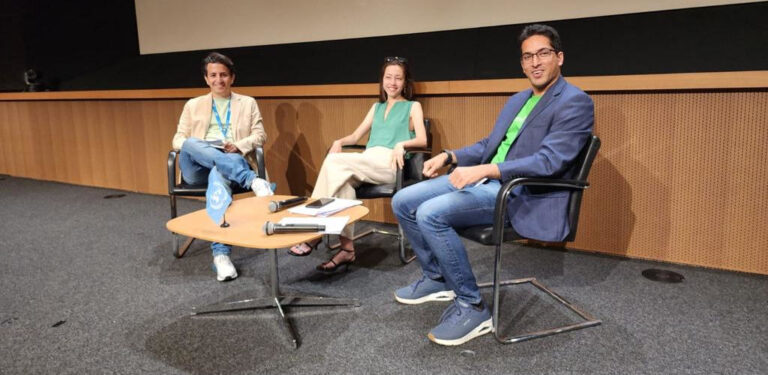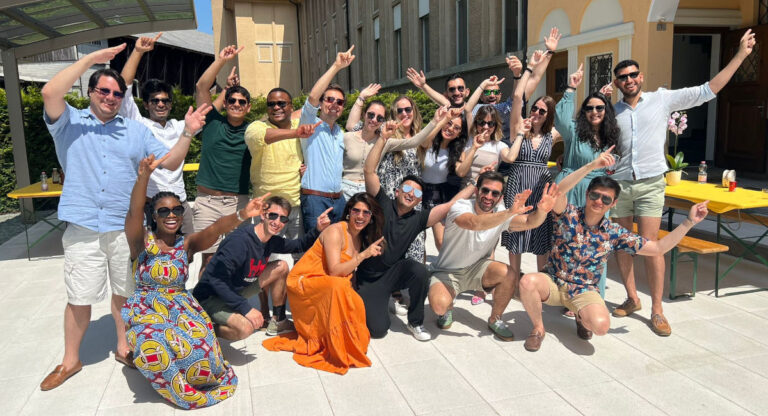
Akané Lièvre was an unlikely candidate for the IMD Women’s Challenge Scholarship for many reasons. Of French and Japanese heritage, she elected to do her medical training in the UK as she admired the idea of free healthcare embodied by the UK National Health Service (NHS) and was greatly attracted to the idea of living and working in London.
After graduating from the Queen Mary University of London with a Bachelor of Medicine and Bachelor of Surgery (MBBS) in 2018, she worked in the NHS for two years before starting to think it was time for a change and actively considered exploring a career outside a clinical setting or further studies.
But it was August 2020, and the COVID-19 pandemic was in full swing. She recalls: “I thought so many doctors are sick or isolating and hospitals are struggling — this is the worst time to be leaving medicine for so many reasons, so I decided to keep going but change my environment instead.”
The change of environment was the prestigious Centre hospitalier universitaire vaudois (CHUV) in Lausanne, where she worked for nearly two years. Having lived and breathed all things medical since the age of 18 (she tellingly describes medicine as “a big but very small world — you’re surrounded by healthcare professionals and patients, and spend the vast majority of your time in a hospital”), the desire for change was stronger than ever, but she did not know what that change might look like. Living in Lausanne and having seen the IMD campus from afar, the Women’s Challenge Scholarship challenge “just popped up” on her radar screen, and she decided to apply.
Desire for change
It was a shot to nothing: “I didn’t know what an MBA was all about, but it was at a time in my career when I wanted to make a switch, so I thought: ‘Why not just do the challenge? At worst, you’ll meet some amazing women [during the five-hour competition] and get to see what another world is like. At best, you’ll get a scholarship.’ I applied on a whim. I didn’t expect to win. I just thought: ‘I’ll give it a chance.’”
Simply doing the challenge was “an amazing experience,” Akané reveals. “I just really enjoyed it. It was incredibly organized. And you get to work with 30 to 40 women and learn so much in such a short space of time.”
She attributes her successful entry to the fact that she tried to enjoy the process as much as possible. “I went in thinking: ‘I’m probably not going to win, I’m just going to enjoy the process and learn as much as possible.’ That mindset enabled me to learn and work well with the other three women in my group. You meet new people, explore different backgrounds, and challenge yourselves together. And it was an incredible group – they had expertise in things I didn’t know anything about, and surprisingly, it was not too competitive.”
Perhaps because she kept her expectations in check all the way through, she was “super excited to win” the challenge – so much so that she did not give a thought to applying elsewhere.

Opening doors
Winning the scholarship, she reveals, “Opened the door for me financially; it would have been tough to do it at that time in my career.” This, she believes, highlights a key virtue of the scholarship. It enables people who want a change in career direction but may otherwise lack the means to take a chance to do something different and opens the door to new opportunities.
Elaborating on why she believes that scholarships for MBAs and executive education are important, Akané adds, “I think it takes a certain amount of courage to stop or take a break in your career, especially in the context of an MBA. It’s a massive opportunity cost, in terms of career advancement [in your current role] and because you’re taking a year or two out when you’re not earning a salary. I think [getting a scholarship] gives you that little bit extra motivation, especially when you are not company-sponsored.”
This, she says, is liberating in itself because scholarship students can think about a future career without having to orientate themselves towards a particular employer, field, or industry: “It’s that time in their career, in their life, where they’re doing something extremely personal and for themselves. And getting the scholarship means they’ve seen something in you, and you want to show them that they did the right thing by believing in you. That’s also a little extra added incentive [to give something back].”

A change of direction
In Akané’s case, the scholarship also enabled a change of direction, and she joined the pharmaceutical giant Eli Lilly in February 2024 as a senior brand manager. Having mostly worked in a clinical setting in her medical career — but not wanting to leave the field of healthcare — she acquired a new perspective during the MBA. “The great thing about IMD is that you have a large network, so you can talk to people who have done lots of different jobs and roles and see what they liked and didn’t like, and what sort of skills and personalities are suited to what roles. I had a mentor who had worked for decades on the commercial side of healthcare in the pharmaceutical sector, and I spoke to a lot of people. That helped me narrow it down and decide that I wanted to use the opportunity post-MBA to explore the commercial side of healthcare.”
It is a role in which she is looking forward to applying the leadership skills she acquired during the MBA. “In medicine, you learn a lot of different skills, but in terms of leadership, it’s extremely hierarchical — you have a professor or a consultant above you who is required to tell you what to do in a way that does not admit uncertainty.”
In contrast, IMD taught her a new approach to leadership.: “You might have six people in a group with completely different expertise and levels of experience — you might be working with someone who’s been in a start-up or an NGO or in the corporate world. The program made me step back and think, ‘What gives people authority? What makes people good leaders?’ I went from being in a very hierarchical setting to having a much more consultative style, where it’s more about convincing your team and bringing them along with you. It’s not about just stating the decision — it’s about coming to the decision together.
“And the cool thing about the MBA is that it’s a low-risk environment, so you get to experiment with different leadership styles, even those you’re unfamiliar with. One of the first pieces of feedback I got was that I needed to learn to take risks and accept failure, which I found difficult to do coming from the medical world. It’s a message I’ve taken on board.”
“If you learn to accept and learn from mistakes, you can achieve much more. Instead of just going with what you know and what you’re used to, you can reach above and beyond. That way, you can achieve incredible things.”


